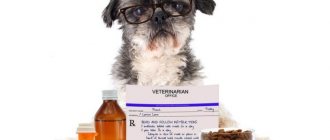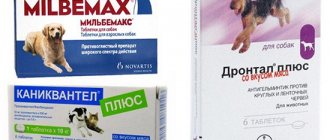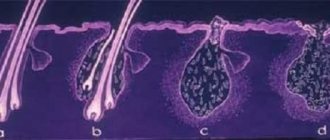January 27, 2016
About ten thousand years ago, the dog became a friend, ally and assistant to man. Since then, Homo sapiens has changed beyond recognition and radically changed the world around it, moving further and further away from unity with the nature that gave birth to it, and creating its own man-made habitat. All this time, the man had his dog next to him. She is still nearby, fully sharing with the owner the comfort and hardships of the post-industrial world.
Indications for use
Does your dog have digestive problems?
Yes
89.99%
No
10.01%
Veterinarians and breeders recommend a course of probiotics for animals in the following cases:
- changing the type of food or switching to a new food;
- restoration of intestinal microflora after antibiotics or anthelmintics;
- prevention and treatment of infectious diseases (parvovirus enteritis, hepatitis, salmonellosis, etc.);
- vaccination period;
- helminthic infestations;
- after surgical interventions;
- food poisoning;
- allergic reactions;
- prevention of stress reactions (exhibitions, moving);
- gastrointestinal diseases as part of complex therapy (gastroenteritis, pancreatitis, colitis);
- feeding puppies or switching to artificial feeding;
- Digestive disorders accompanied by diarrhea or constipation in dogs.
Probiotics prevent the development of dysbiosis against the background of the above factors. Biologics are also used to treat dysbiosis and enhance the body's immune response.
Probiotics and prebiotics for dogs: differences
Probiotics are live microorganisms that, when administered in a therapeutic dose, improve digestion, suppress the growth of the population of pathogenic bacteria, and reduce inflammatory processes in gastrointestinal diseases in dogs.
Prebiotics are components of synthetic or organic origin that are not digested in the stomach, but are fermented by beneficial microflora in the lower intestines. They serve as a breeding ground for “friendly” bacteria and help increase their population.
Often, manufacturers of veterinary feed additives produce combination products that contain both probiotics and prebiotics. Such drugs are called synbiotics.
Gastrointestinal diseases
Microorganisms in the human intestine take up a lot of space. But in terms of mass, they weigh approximately 2-3 kg for an adult. A person of such weight not only has to be given water and food, but often also treated.
Artificial support is also often required for the intestines under conditions of stress, poor nutrition, and a sedentary lifestyle. And so-called probiotics and prebiotics are suitable for this case.
Probiotics
Zooprobiotics most often contain bacteria from the group Lactobacillus, Bifidobacterium and Enterococcus faecium, which are the main inhabitants of the intestines of dogs. The following is a description of the best drugs in this category.
FortiFlora
The feed additive is a powder with a meat flavor. The drug is enriched with the probiotic Enterococcus faecium SF68, vitamins C, E, trace elements and yeast. Fortiflora powder for dogs is added directly to food.
Advantages and disadvantages
convenient release form;
additionally contains vitamins and minerals;
high price.
Bifidum SHS
The powder is enriched with bifidobacteria for the treatment and prevention of digestive disorders of any etiology. The probiotic is prescribed to dogs for allergies as part of complex therapy. The dosage is calculated based on the age and weight of the animal. The average course of treatment is 5-7 days.
pros
can be used in puppies from the first days of life;
Suitable for small, medium and large breed dogs;
does not cause adverse reactions;
low price.
Vetom 1
Probiotic based on Bacillus subtilis. Restores intestinal biocenosis, improves the absorption of nutrients, and normalizes digestion. The drug is also prescribed for immunodeficiency conditions in animals.
Advantages and disadvantages
has no taste or smell;
when taken simultaneously with antibiotics, the probiotic effect is neutralized;
high price.
Lactoferon
Tablets with probiotics and phytocomplex. Contains beneficial microorganisms for the dog's intestines: lacto-, bifidobacteria, streptococci. It has antimicrobial, anti-inflammatory and antiviral properties due to the content of medicinal plant extracts.
Advantages and disadvantages
suitable for dogs of all breeds;
affordable price;
has contraindications;
may cause allergies.
Bifitrilak MK
The probiotic complex contains bifidum, lactobacilli and a natural adsorbent. Effective for food poisoning, intestinal infections, allergies and disorders of the dog’s digestive system.
pros
available in veterinary pharmacies;
economical consumption of the drug;
no smell or taste;
one of the cheapest probiotics;
does not cause side effects even in case of overdose.
General recommendations
Having studied a fairly large body of scientific literature, we can formulate general recommendations for the use of probiotics. First things first: probiotics are essential for your pets to develop a healthy digestive system and immune system.
The first thing you need to pay attention to when purchasing dry food with probiotics is the number of CFUs. This will help you decide whether you need to purchase additional probiotics or, if you are already giving your pet probiotics in a different form, whether it will be too much.
If the number of CFUs on the package is not written, well, you can either choose another food, or hope that someone in the food remains alive...
1. Effects of probiotic Lactobacillus acidophilus strain DSM13241 in healthy adult dogs. Baillon ML1, Marshall-Jones ZV, Butterwick RF.
Prebiotics
As prebiotics, feed additives may contain inulin, pectin, wheat bran, fructooligosaccharides, lactulose and other components that have a prebiotic effect.
Unitabs Prebiotic
Vitamin and mineral complex with prebiotics (inulin, wheat bran, pectin) and coenzyme Q10. Suitable for small, medium and large breed dogs. Recommended for animals when changing food to prevent digestive disorders, as well as for comprehensive hair care.
The dosage is calculated according to the following scheme: 1 tablet per 5 kg of weight. Can be given to puppies from 3 weeks of age. The tablet is pre-crushed and mixed with food or fed by hand.
Advantages and disadvantages
affordable price;
suitable for all breeds;
improves wool quality;
Not all animals willingly eat tablets, so it is sometimes problematic to give the drug to large dogs.
Viyo (Viyo)
Prebiotic in liquid form to normalize digestion and strengthen immunity in dogs of all ages and breeds. Additionally contains vitamins and minerals. With regular use, it reduces the risk of developing urolithiasis in dogs.
The nutritious drink is packaged in individual 30 ml sachets.
Advantages and disadvantages
dogs willingly drink a meat-flavored drink;
convenient to calculate the dosage;
the manufacturer separately produces products for adults, older dogs and puppies;
high price.
Vetelakt
Lactulose-based syrup for dogs suffering from constipation. The drug has no specific taste or smell. It can be mixed with food, water and milk. For 1 kg of weight give 0.1 ml of the drug. The course of treatment is 30 days.
Advantages and disadvantages
compatible with other feed additives;
affordable price.
may cause diarrhea in case of overdose.
Signs of dysbiosis in a dog
Dysbacteriosis has a rather vague clinical picture, so it can easily be confused with other diseases - urolithiasis, intestinal circulatory disorders, liver damage.
You need to focus on the chronic course of the disease - the condition does not change even with a thorough correction of the diet and daily routine.
Signs of concern should include:
- bloating;
- flatulence;
- decreased appetite or lack thereof;
- apathy, depressed state;
- drowsiness;
- deterioration in the appearance of fur;
- bloody diarrhea or constipation;
- showing interest in food that the dog has never eaten before.
If you suspect dysbacteriosis, you need to monitor the dog for several days. An animal with a weakened immune system should be switched to a dairy diet, including goat milk, cottage cheese, curdled milk, and homemade yogurt.
In addition, the dog needs to be given immunostimulants, for example, Gamavit. If after a few days the condition improves, then we are really talking about dysbiosis.
The next step should be a visit to the veterinary hospital, where a specialist, taking into account the animal’s condition and signs, will explain how to treat the dog. To diagnose the disease, the following methods are used: biochemical blood test, stool examination, endoscopic examination.
Synbiotics
Combined preparations based on probiotics and prebiotics provide a good therapeutic effect due to their double effect on the intestinal microflora. They simultaneously populate the intestines with bacteria and act as a breeding ground for beneficial microorganisms.
Canigest
Feed additive produced in Ireland, produced in the form of a paste. Contains the probiotic Enterococcus faecium and prebiotics – fructooligosaccharides, mannon oligosaccharides, pectin. The composition contains kaolin, which is a natural absorbent and removes waste and toxins from the animal’s body.
The dosage depends on the weight and age of the pet. Adult dogs are shown:
- up to 5 kg – 2 ml;
- 5-15 kg – 3 ml;
- 15-30 kg – 5 ml;
- More than 30 kg – 7 ml;
- 35-40 kg – 8 ml;
- More than 45 kg – 10 ml.
Puppies are allowed 1-2 ml of paste per dose. Give 2-3 times a day for 5 days. Fed as a treat from a syringe or added to food.
Advantages and disadvantages
convenient syringe dispenser;
attractive meat taste.
not always available for sale;
high price.
An analogue of Kanigest is the probiotic paste Pro-Kolin (Prokolin).
Pet Naturals of Vermont Daily Probiotic
Chewable seed tablets made in the USA contain dried Bacillus coagulans fermentation product, prebiotic complex and yeast.
Dogs happily eat the drug as a treat due to its meaty taste. The synbiotic has a beneficial effect on the functioning of the gastrointestinal tract and improves the quality of skin and coat.
The dietary supplement is included in the daily diet for digestive problems. The prebiotic complex is especially useful for animals whose diet is based on dry food.
Give one tablet per 10 kg of dog weight. For small breeds weighing 2 kg or more, the chewing bone is divided into 2 parts.
Advantages and disadvantages
can be used as a treat;
suitable for a long course;
The best ratio of price and quality;
cannot always be found in veterinary pharmacies.
Zoonorm
Contains probiotic Bifidobacterium bifidum and lactose. The drug can be given with any liquid and food once a day.
pros
wide range of indications;
low cost.
Lactobifadol forte
The main components of the synbiotic are bifidobacteria and lactobacilli. It is produced in the form of a homogeneous free-flowing powder, resembling bran in appearance. Contains dietary fiber that acts as a prebiotic.
Advantages and disadvantages
has a wide range of indications;
can be combined with taking antibiotics;
allowed to be given to puppies from the first days of life;
effective for allergic dermatitis.
it is difficult to calculate the dosage for small breeds;
Some dogs refuse to eat the product on their own.
Akti-dog
Dry powder, which is a complex of bifidobacteria, lactobacilli and streptococci. Contains inulin as a prebiotic. Additionally, the composition includes yeast.
The feed additive is prescribed for dermatitis and the prevention of dysbiosis. Suitable for large and medium breed dogs. The manufacturer also produces a synbiotic of the same name for puppies and small breeds of dogs. The product can be mixed with water, milk, fermented milk drinks, and added to food.
Advantages and disadvantages
wide spectrum of action;
the best ratio of price and therapeutic effect;
has a specific smell that dogs may not like.
What human probiotics can you give to your dog?
Among the human probiotics, you can give your dog Bifidumbacterin and Linex. The first drug contains only bifidobacteria. The second contains a complex of probiotics: Lactobacillus acidophilus, Bifidobacterium infantis, Enterococcus faecium.
However, veterinarians recommend choosing zooprobiotics, since drugs for humans differ in dosage and are not aimed at the specific treatment of dogs.
Is there a “magic pill”?
Probiotic preparations appeared somewhere in the middle of the last century. Then they spread. The drugs demonstrated their remarkable properties in numerous experiments.
This group of drugs had practically no contraindications, and many thought that a magic elixir had been found. I took a pill and forgot about my health problems. But these were only forecasts. In practice, many patients simply wasted their money, and the results were not always pleasing to the patients. Currently, more and more reports have begun to come not about the benefits of the drug, but about its harm to health.











